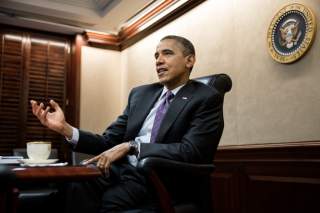Principled Pragmatism: Fredrik Logevall on Obama's Legacy
The Pulitzer Prize–winning historian on strategy in the Obama era.
On the other side of the ledger, it’s very hard to say that the decisionmaking on Syria during the last three or four years has worked, and you could ultimately be highly critical of the president, because he’s responsible—but let’s also say the United States, for its decisions on that particular conflict—which are again understandable, because even under the best of circumstances it was a terribly, terribly difficult proposition. Nevertheless, that policy, I think by most measures, did not succeed, and there are certain other particular policy decisions that I think we could question. But in the overall sense, pretty high marks.
You said that you are concerned about the U.S. global dominance model. Again, let me challenge you. There are other great powers, China, Russia, which would like to see the U.S. out of the way and have values inimical to ours. If not us, who then?
They are not, however, in a position to assume that mantle of global dominance. If not us, it’s nobody, and I am comfortable with nobody. Bear in mind that I am not suggesting a kind of withdrawal, an isolationist kind of pulling back to the physical frontiers of the United States. Not at all.
I am attracted to an idea—we can call it “offshore balancing,” we can call it something else—which basically says we need to prioritize, that there are certain regions of the world that we are going to give emphasis to, and we are going to resist the temptation to nation-build and engage in counterinsurgency, and we are going to have a smaller footprint, and as a consequence of this reduce perhaps to some extent the size of the national security state, which I think could be beneficial.
Arguably, I am a historian, so I have less in-depth knowledge of the thinking in the administration now, but this is what the administration has been moving toward.
Do you think Americans should fight for the freedom and democracy of other people in the world?
Yes, but I do think as a Swede, and I know this is what Swedes grasp, and what many people around the world grasp—that the United States best represents over the last century a kind of model in some ways, certainly as the entity we can call on wherever we are in the world to help fight for democracy, and that’s very powerful. I don’t think the United States should get away from that. Some of that is possible to do.
Here’s the “but”: I think what the United States needs to do in order to fight for the democracy of others is to rely mostly on its soft power. It’s about American institutions, it’s about American culture, it’s about the American system. For me, that’s what ultimately won the Cold War much more that than the arms build-up, much more than the proxy wars that the United States fought. It’s really what the United States represented more than anything else. The best way to engage in that struggle for democracy on behalf of others around the world is to model it here at home.
It’s about improving our own democracy, which I think has seen better days. Yes, but it has to be clearly connected to the interests of the United States, and mission creep is a real problem, which is why I believe soft power and its connections to what we have here at home are so important.
Paul Richard Huard is an award-winning journalist who covers military history and national security issues for daily newspapers and online publications. His work appears in the (Portland, Ore.) Oregonian, RealClearDefense, RealClearHistory, RealClearPolitics, War Is Boring, War On The Rocks—Molotov Cocktail, and We Are The Mighty. In addition, Huard’s stories have been reprinted by the National Interest.
Image: Flickr/The White House

